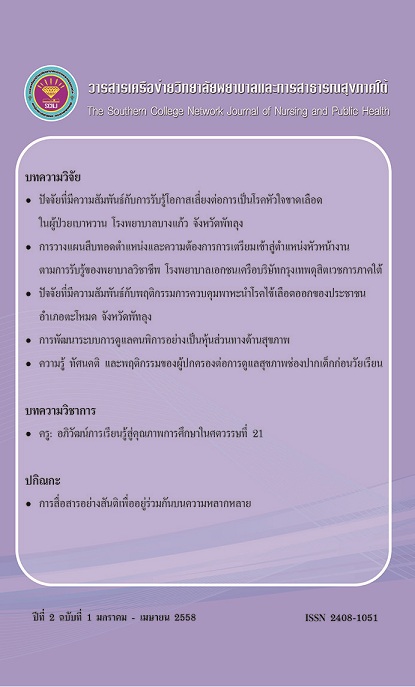ปัจจัยที่มีความสัมพันธ์กับพฤติกรรมการควบคุมพาหะนำโรคไข้เลือดออกของประชาชน อำเภอตะโหมด จังหวัดพัทลุง
คำสำคัญ:
โรคไข้เลือดออก, การควบคุมโรค, Dengue Hemorrhagic Fever, Dengue Vector Controlบทคัดย่อ
การศึกษานี้เป็นการวิจัยเชิงพรรณนามีวัตถุประสงค์เพื่อศึกษาพฤติกรรมการควบคุมพาหะนำโรคไข้เลือดออก และปัจจัยที่มีความสัมพันธ์กับพฤติกรรมการควบคุมพาหะโรคไข้เลือดออกของประชาชนอำเภอตะโหมด จังหวัดพัทลุง เก็บรวบรวมข้อมูลระหว่างเดือนพฤศจิกายน-ธันวาคม พ.ศ.2556 จากกลุ่มตัวอย่างจำนวน 378 ราย โดยการสุ่มตัวอย่างแบบมีระบบ ด้วยแบบสอบถามที่ผู้วิจัยสร้างขึ้น ผ่านการทดสอบความตรงของเนื้อหาด้วยความสอดคล้อง (IOC) เท่ากับ .67 และหาค่าความเชื่อมั่นด้วยค่าสัมประสิทธิ์แอลฟาของครอนบาค ด้านทัศนคติ ด้านปัจจัยเอื้อปัจจัยเสริม ด้านพฤติกรรม ได้ค่าความเชื่อมั่นเท่ากับ .78, .81, .78 สำหรับด้านความรู้ได้ค่า KR-20 เท่ากับ .81 ตามลำดับ วิเคราะห์ข้อมูล ร้อยละ ค่าเฉลี่ยเลขคณิต ส่วนเบี่ยงเบนมาตรฐาน และสัมประสิทธิ์สหสัมพันธ์ของเพียร์สัน
ผลการศึกษาพบว่าพฤติกรรมการควบคุมพาหะนำโรคไข้เลือดออกมีคะแนนอยู่ในระดับปานกลาง (M=9.74, SD=3.02) เมื่อจำแนกเป็นรายด้านพบว่าพฤติกรรมการควบคุมพาหะนำโรคไข้เลือดออกด้านกายภาพมีคะแนนเฉลี่ยอยู่ในระดับสูง (M=6.02, SD=1.43) พฤติกรรมการควบคุมพาหะนำโรคไข้เลือดออกด้านเคมีมีคะแนนเฉลี ่ยอยู่ในระดับปานกลาง (M=2.53, SD=1.29) และพฤติกรรมการควบคุมพาหะนำโรคไข้เลือดออกด้านชีวภาพมีคะแนนเฉลี่ยอยู่ในระดับต่ำ(M=1.18, SD=1.40) และยังพบว่า ปัจจัยเอื้อ (r=0.16, p-value=0.00) ได้แก่ ความเพียงพอของทรัพยากร ปัจจัยเสริม (r=0.14, p-value=0.01) ได้แก่ การได้รับข้อมูลข่าวสารและการได้รับคำแนะนำจากเจ้าหน้าที่สาธารณสุขหรืออาสาสมัครสาธารณสุขประจำหมู่บ้าน มีความสัมพันธ์ทางบวกในระดับต่ำกับพฤติกรรมการควบคุมพาหะนำโรคไข้เลือดออกอย่างมีนัยสำคัญทางสถิติที่ระดับ 0.01
ดังนั้นควรมุ่งเน้นส่งเสริมการควบคุมพาหะนำโรคไข้เลือดออกทางด้านกายภาพ และสนับสนุนปัจจัยเอื้อด้านความเพียงพอของทรัพยากร ตลอดจนปัจจัยเสริมด้านการเผยแพร่ข้อมูลข่าวสาร และคำแนะนำจากเจ้าหน้าที่สาธารณสุขหรืออาสาสมัครสาธารณสุขประจำหมู่บ้าน
Factors Related to Dengue Vector Control Behaviors of People in Tamode District, Phattalung Province
The purposes of this descriptive study were to determine dengue vector control behaviors and to identify factors associated with those behaviors in Tamode district, Phatthalung province, Southern Thailand. Data were collected from 378 samples using a systematic random sampling during November-December, 2013. Research questionnaire developed by the researcher was employed for data collection. Validity of the questionnaire was confirmed; the Index of item objective congruence (IOC) was .67 Reliability of the questionnaire regarding attitude, enabling and reinforcing factor, and behavior was tested using Cronbach’s alpha coefficient and yielded the values of .78, .81, and .78, respectively. Whereas the knowledge was tested by KR-20; the reliability was .81. Data were analyzed using percentage, mean, standard deviation, and Pearson productmoment correlation.
The results showed that the overall aspect of dengue vector control behaviors was at a moderate level (M= 9.74, SD = 3.02). When considering each aspect, it was found that the physical dengue control behaviors was at a high level (M= 6.02, SD = 1.43); the chemical dengue control behaviors was at a moderate level (M= 2.53, SD = 1.29); and the biological dengue control behaviors was at a low level (M= 1.18, SD = 1.40). It also found that the enabling factor—the adequacy of resources, and the reinforcing factor—getting information and advice from health personnel or village health volunteers were correlated with the behaviors of dengue vector control statistically significant (r=0.16, p< .01, and r=0.14, p< .01, respectively).
The findings suggested that the Dengue vector control should be promoted including the physical control, adequate resources support, information sharing, and advices from health personnel or village health volunteers.
ดาวน์โหลด
เผยแพร่แล้ว
ฉบับ
ประเภทบทความ
สัญญาอนุญาต
1. บทความหรือข้อคิดเห็นใด ๆ ที่ปรากฏในวารสารเครือข่าย วิทยาลัยพยาบาลและการสาธารณสุขภาคใต้ ที่เป็นวรรณกรรมของผู้เขียน บรรณาธิการหรือเครือข่ายวิทยาลัยพยาบาลและวิทยาลัยการสาธารณสุขภาคใต้ ไม่จำเป็นต้องเห็นด้วย
2. บทความที่ได้รับการตีพิมพ์ถือเป็นลิขสิทธิ์ของ วารสารเครือข่ายวิทยาลัยพยาบาลและการสาธารณสุขภาคใต้








